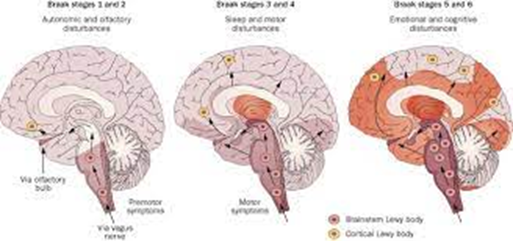Lewy
body dementia
Overview
Lewy body dementia, also
known as dementia with Lewy bodies, is the second most common type of
progressive dementia after Alzheimer's disease. Protein deposits, called Lewy
bodies, develop in nerve cells in the brain regions involved in thinking,
memory and movement (motor control).
Lewy body dementia causes a
progressive decline in mental abilities. People with Lewy body dementia might
have visual hallucinations and changes in alertness and attention. Other
effects include Parkinson's disease signs and symptoms typical of Parkinson’s
disease, such as rigid muscles, slow movement, walking difficulty and tremors.
Symptoms
Lewy body dementia signs and
symptoms can include:
Visual
hallucinations. Hallucinations —
seeing things that aren't there — might be one of the first symptoms, and
they often recur. People with Lewy body dementia might hallucinate shapes,
animals or people. Sound (auditory), smell (olfactory) or touch (tactile)
hallucinations are possible.
Movement disorders.
Signs of Parkinson's disease (parkinsonian signs), such as slowed movement,
rigid muscles, tremor or a shuffling walk can occur. This can lead to falling.
Poor regulation of
body functions (autonomic nervous system).
Blood pressure, pulse, sweating and the digestive process are regulated by a
part of the nervous system that is often affected by Lewy body dementia. This
can result in sudden drops in blood pressure upon standing (orthostatic
hypotension), dizziness, falls, loss of bladder control (urinary incontinence)
and bowel issues such as constipation.
Cognitive problems. You
might have thinking (cognitive) problems similar to those of Alzheimer's
disease, such as confusion, poor attention, visual-spatial problems and memory
loss.
Sleep difficulties.
You might have rapid eye movement (REM) sleep behavior disorder, which can
cause you to physically act out your dreams while you're asleep. This might
involve behavior such as punching, kicking, yelling and screaming while
sleeping.
Fluctuating attention.
Episodes of drowsiness, long periods of staring into space, long naps during
the day or disorganized speech are possible.
Depression.
You might develop depression.
Apathy.
You might lose motivation.
Causes
Lewy body dementia is
characterized by the abnormal buildup of proteins into masses known as Lewy
bodies. This protein is also associated with Parkinson's disease. People who
have Lewy bodies in their brains also have the plaques and tangles associated
with Alzheimer's disease.
Risk factors
A few factors seem to
increase the risk of developing Lewy body dementia, including:
Age.
People older than 60 are at greater risk.
Sex.
Lewy body dementia affects more men than women.
Family history.
Those who have a family member with Lewy body dementia or Parkinson's
disease are at greater risk.
Complications
Lewy body dementia is
progressive. Signs and symptoms worsen, causing:
Severe dementia
Aggressive behavior
Depression
Increased risk of falling
and injury
Worsening of Parkinsonian
signs and symptoms, such as tremors
Death, on average about
seven to eight years after symptoms start.
Jan Ricks Jennings, MHA,
LFACHE
Senior Consultant
Senior Management
Services, LLC
JanJenningsBlog.Blogspot.com
412.913.0636 Cell
724.733.0509 Office
January 30, 2022



No comments:
Post a Comment